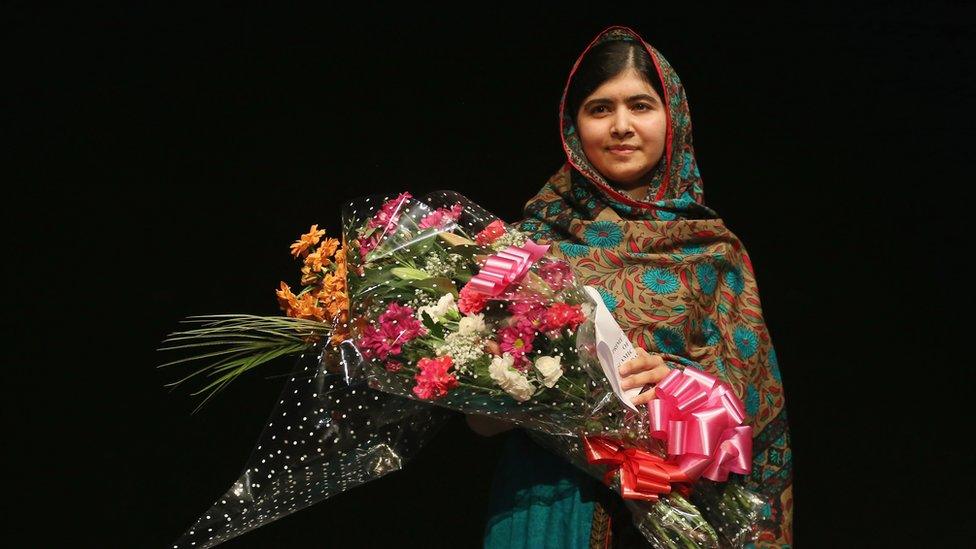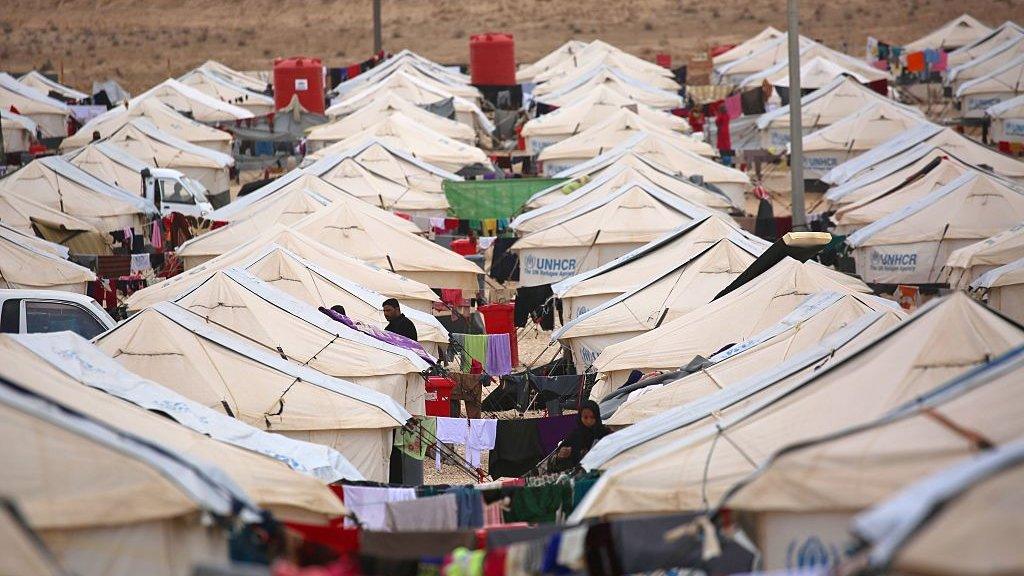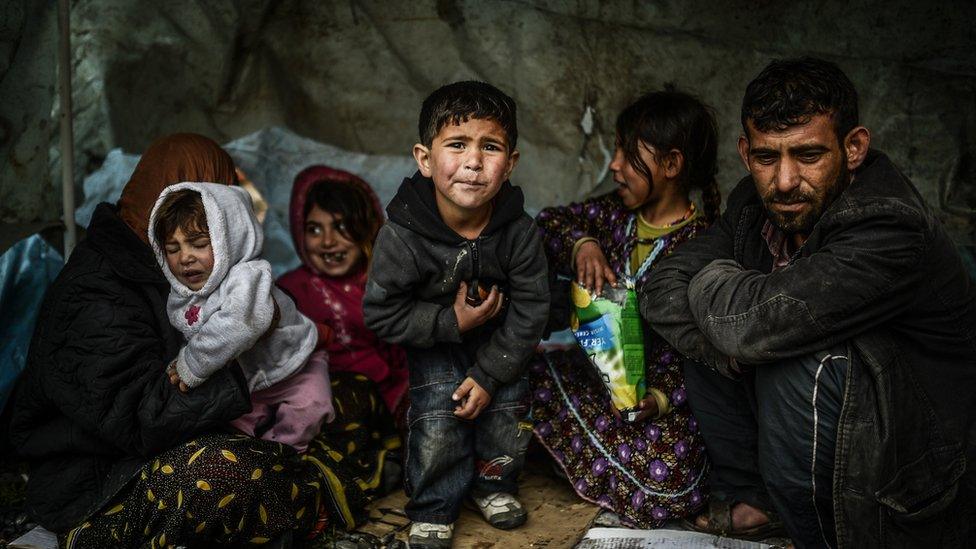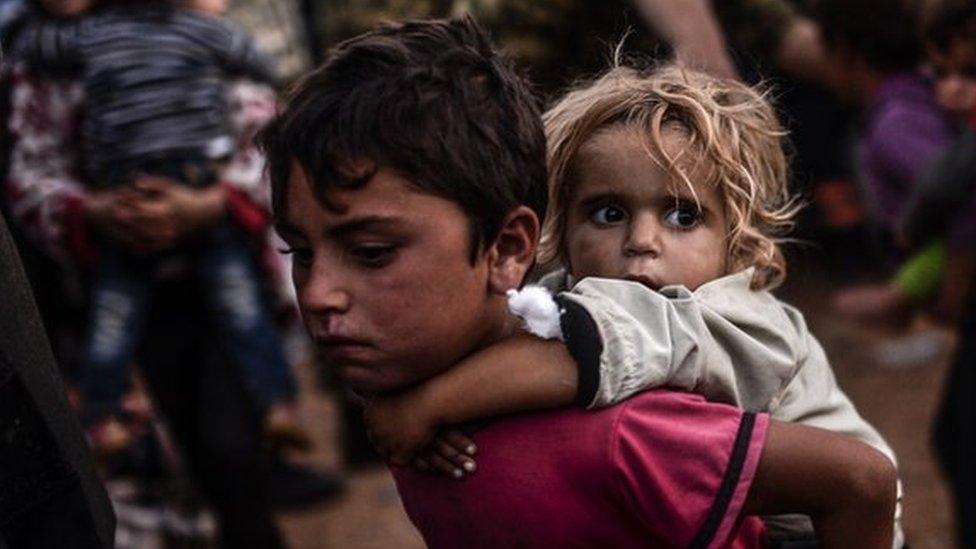Trump suspends US refugee programme and bans Syrians indefinitely
- Published
President Trump told CBN News Christian refugees will get priority
President Donald Trump has banned the entry of Syrian refugees into the US until further notice.
He has also halted the issuing of visas to the nationals of six other mainly Muslim countries, including Iran, Iraq, Yemen and Libya, for three months.
Mr Trump said the measures were part of new measures to "keep radical Islamic terrorists out of the US".
Rights groups have condemned the move, saying there is no link between Syrian refugees in the US and terrorism.
Under Mr Trump's wide-ranging executive order, all refugee admissions have been suspended for four months.
Mr Trump signed the order at the Pentagon after a ceremony to swear in Gen James Mattis as defence secretary.
During the ceremony, he said: "I'm establishing new vetting measures to keep radical Islamic terrorists out of the United States of America. We only want to admit those into our country who will support our country and love deeply our people."
The text of the order was released several hours after it was signed. Among the measures are:
Suspension of the US Refugee Admissions Programme for 120 days
A ban on refugees from Syria until "significant changes" are made
A 90-day suspension on anyone arriving from Iraq, Syria, Iran, Libya, Somalia, Sudan, and Yemen, except certain visa categories such as diplomats
To prioritise future refugee applications from those persecuted for their religion - but only if the person is part of a minority religion in their home country
A cap of 50,000 refugees in 2017 - less than half of the upper limit under Mr Trump's predecessor, Barack Obama
However, a mention of creating "safe zones" within Syria, seen in an earlier draft, was removed from the final order.
The order also said all immigration programmes should include questions to "evaluate the applicant's likelihood of becoming a positively contributing member of society."
In a TV interview broadcast earlier on Friday, the president said Christians would be given priority among Syrians who apply for refugee status in the future.
The US city of Lancaster has taken in hundreds of refugees - but that could all end
Other measures include a broad review of the information required from all countries to approve a visa; a review of visa schemes between nations to ensure they are "truly reciprocal" for US citizens; and the immediate suspension of the Visa Interview Waiver Programme.
But the document says exceptions to most restrictions could be made on a case-by-case basis.
President Trump also signed an executive order aimed at rebuilding the military by "developing a plan for new planes, new ships, new resources and new tools for our men and women in uniform".
Last year, Mr Obama's administration admitted 10,000 Syrian refugees into the US. Neighbouring Canada - whose population is a ninth of that of the US - took in 35,000.
During the election campaign, Mr Trump suggested a "total and complete shutdown of Muslims entering the United States until our country's representatives can figure out what is going on".
But he has made no mention of this since his victory last November.
Trump's 'yuge' first week as president recapped
The executive order has been met with criticism from rights organisations, Democrats and notable figures.
Democratic Senator Kamala Harris noted that the order had been signed on Holocaust Memorial Day. "Make no mistake - this is a Muslim ban," she wrote.
"During the Holocaust, we failed to let refugees like Anne Frank into our country. We can't let history repeat itself," she said.
And New York Mayor Bill de Blasio said he was "profoundly saddened" and the president had sent "a shamefully different message" than the country's founding beliefs.
Malala Yousafzai, the teenage Nobel Peace Laureate who was shot by the Taliban following her advocacy for women's education in Pakistan, wrote that she was "heartbroken".
"America is turning its back on a proud history of welcoming refugees and immigrants - the people who helped build your country, ready to work hard in exchange for a fair chance at a new life," she added.

The world's youngest winner of the Nobel Peace Prize said she was "heartbroken" by the order
Facebook founder Mark Zuckerberg also posted a lengthy note, external, saying he was "concerned" about the president's executive orders, and noting that he, like many Americans, is the descendant of immigrants.
The head of American Civil Liberties Union (ACLU) condemned the use of the words "extreme vetting", saying it was a "euphemism for discriminating against Muslims".
"Identifying specific countries with Muslim majorities and carving out exceptions for minority religions flies in the face of the constitutional principle that bans the government from either favouring or discriminating against particular religions," Anthony Romero said in a statement, external.

If you have any questions about the new vetting measures which President Trump has announced, send them to us and a BBC correspondent will answer the most popular.
Use this form to ask your question:
If you are reading this page on the BBC News app, you will need to visit the mobile version of the BBC website to submit your question on this topic.
- Published28 January 2017

- Published20 November 2015

- Published19 November 2015
